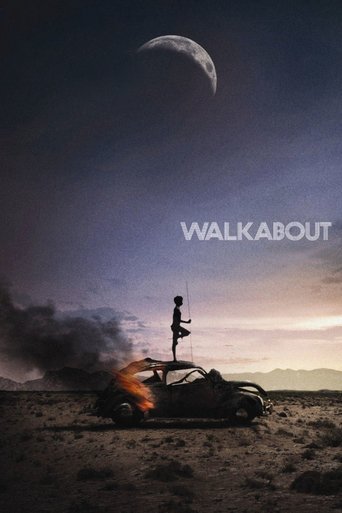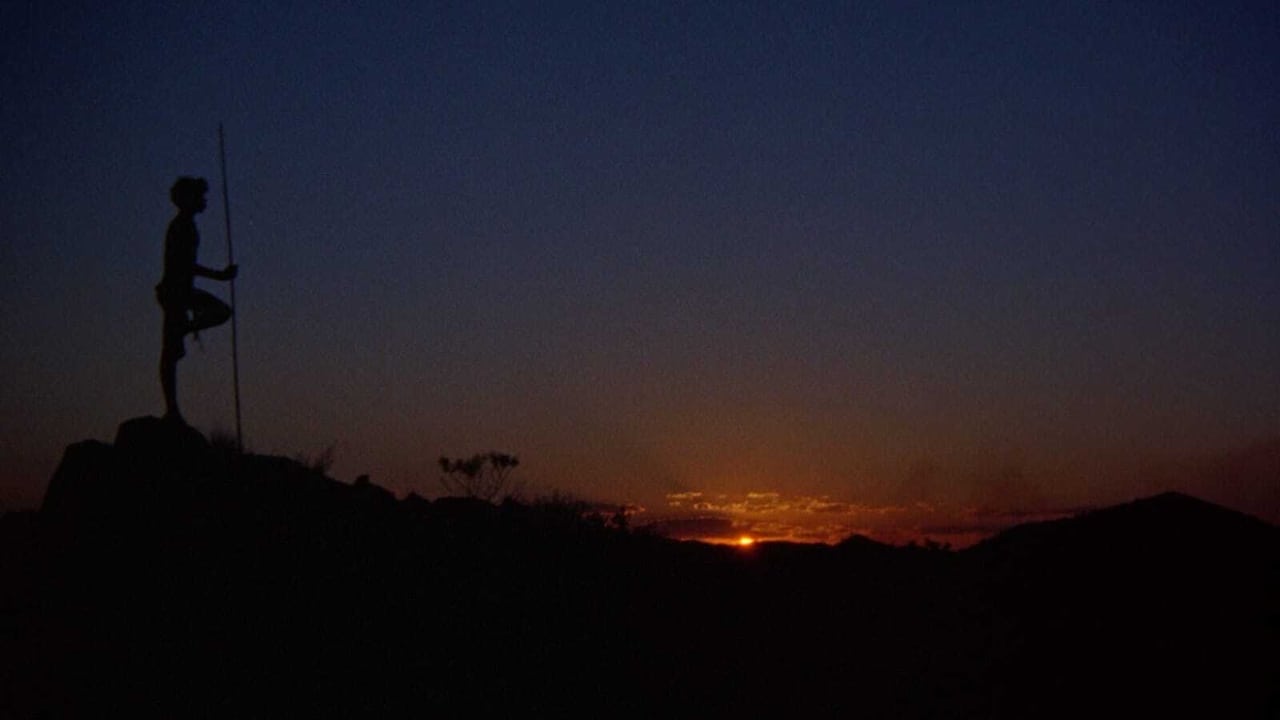Phillim
Despite flaws -- e.g. *very* sporadic and brief moments of didactic heavy-handedness -- this film wins a ten for pure originality and courage, sumptuous visual poetry, general respect for the audience's intelligence, and, perhaps most of all, for bringing the remarkable and thoroughly unique David Gulpilil to a career in film -- he's a revelation. His cultural icon status is well-deserved.I am about the same age as 'Walkabout''s main actors, and saw this film in the theater when it was released in the US in 1972, and saw it again last night (27 March 2017) on DVD. It made quite an impression on me as a kid -- reviewing it 45 years later I realized I remembered every shot save for the few and far-between clunky bits, which long ago my genius editor of a memory left on the cutting room floor of the mind. I do understand why some see the film as a stacked-deck screed re 'primitive indigenous beauty' vs. 'industrial white insanity'. Even were that part of the film-maker's original intent, what happens on the film (I say "on" the film as it is a story told in pictures) transcends any such reductive literal-mindedness. 'Walkabout' absorbed and transformed this humble viewer -- doing things only a film can do.The two-disc DVD I watched last night included excellent commentary by Nic. Roeg, and had a whole reel of extras including a fascinating documentary on Gulpilil as of 2002 I believe. The lean and tireless, elegant mature Gulpilil tells his story in his own words, with occasional commentary by experts on the social context of his career. Toward the conclusion one senses the real-time growing pressure on the subject caught between his traditional culture and the film business/'white-man' world -- his admitted substance and alcohol use, and bitterness at not accumulating the wealth of a 'Hollywood star'. Subsequently I read of his great troubles in recent years, and it is heartbreaking. I pray for him and his family, and trust his strength and giving spirit will prevail.
Michael_Elliott
Walkabout (1971) *** 1/2 (out of 4) A girl (Jenny Agutter) and her young brother (Luc Roeg) find themselves in the Australian outback trying to survive after being left out there. Soon they run across a hunter (David Gulpilil) who is out there on a "walkabout." Nicolas Roeg's WALKABOUT is without question one of the greatest looking films that you're ever going to see. I've often said that this film did for the outback what Stanley Kubrick's 2001: A SPACE ODDYSEY did for space. I mean, whenever you think of a dessert setting your mind can't help but go to the images on display throughout this poetic look at struggle.For my money the greatest thing done by Roeg is just the atmosphere and setting that he creates. There's not too much dialogue but what really moves the film is the beautiful music score and cinematography. The images that we view are breathtaking from the opening scenes to the closing ones. The stuff in the outback is beautifully captured and there's no doubt that the setting comes to life. The music score also perfectly captures the innocence and beauty of everything going on.The performance by the three leads are another major plus. Agutter rightfully became a name after this picture and it's easy to see why. The role here certainly isn't flashy but the actress is able to do so much with such little dialogue. Her eyes certainly tell you everything you need to know and there's a very intelligent performance. You can see her intelligence without her saying a word. Both Roeg and Gulpili are equally as great in their supporting roles.WALKABOUT is certainly a very poetic film that has some of the greatest images that you're ever going to see. It's really a film full of life and the way it plays out holds your attention from start to finish.
AndyUK1
This film has just appeared on the BBC Iplayer. For its age I thought it was quite good and stood the test of time quite well. It is however totally let down by the voyeuristic content, primarily, but not limited to, Jenny Agutter. She may have been 17 when filming this but why on earth does she wear such a short skirt, why does the director dwell on her legs so much much (i started to get concerned when there was the view of her getting the picnic out of the car) - she is presumably playing a schoolgirl and these shots are totally inappropriate and add nothing to the film whatsoever. I get the swimming scene and what these add, but it too is far too long and the shots dwelling on her bottom are a total disgrace. It really made me feel quite concerned. I'm not a film buff and have joined IMDb today just to register my comments. Some of the nonsense on these posts supporting the film in this regard are really quite deluded.The UK film board had an opportunity to ban this film and that was a missed opportunity.
sharky_55
If a nature documentary Attenborough style chooses the choicest shots, the majestic voice-over and score to elicit maximum excitement and wonder, Roeg's Walkabout does the opposite. It does not seek to amaze, but present an unflinching look at the Australian outback, where at any time you could be hundreds of kilometres from the nearest petrol station. Roeg shoots with a tenacity for the fauna and flora; horny lizards bathe in the ember sun, wombats prod at sleeping children, ant and flies are ever constant. The temptation to err and fleetingly capture Uluru in all its size and iconicity is rejected. He will zoom into a random incident of an animal devouring another, giving it no symbolic power but simply showcasing the harshness for what it is. And then he will zoom out from our characters, contextualising them and making them tiny amongst the crimson red hills of sand. Barry's score, with its cacophony of bleeps, high pitched shrieks, radio static and echidna paws trampling up dust, adds a hallucinogenic mood and makes the great stretches of land vast and infused with a haunting beauty. The trees respond to this and seem to shiver in the hot wind. Sometimes, he will forgo hard cuts and dissolve cliffs and mountains and other scenery against each other, as if to represent passing of time. But he never puts a definite marker on these periods; a crucial element of the story is the vagueness of this perception, as the pair wander confused, lost and desperate. Prior to this wandering, there is a wordless intro of sorts, where we survey the image of modernity in 70s Adelaide, but against the backing of a didgeridoo. Roeg is selective about inserting hints of this world with our main narrative. As our nameless Aboriginal boy on his walkabout hunts and skins a kangaroo, we crosscut over to a butcher who mimics the same actions; who tears at tendons with his hands rather than his teeth, but the intent is the same. Dangling and playing around trees is compared to a group of Indigenous women having their fun in the now burnt husk of the car. And in one moment where the two collide, and Barry's score kicks into a haunting gear, and we freeze-frame on animals escaping and reverse this again and again. But I do think in this instance it is a tiny bit over dramatic - it may be in little Luc's perspective, but is the objective of hunting quite so different? And then there is something which they both share, because it is the inescapable nature of humans. Jenny Agutter was 17 by the time that filming began and it was even more appropriate, as she neared adulthood. She has to continually reign in his younger brother, whom is oblivious to the situation, as well as deal with her developing sexuality. The sensual glances from the Aboriginal boy (and I think from the father too at the beginning, very subtly, who has recognised her physical growth) mirror those of the weather scientists towards their female colleague. Two teenagers will share glances at sensually formed branches in the dark, and as she explores the ruins of an old shack and the burial mounds of the inhabitants, he ha a wide grin on his face as he looks over. Roeg intercuts this with a extreme closeup of a termite burrowing its way out of the dirt ground, as if trying to form a conscious connection between the two worlds, but it is in vain. Likewise, when he performs a ritualistic mating dance, with clay smeared body paints, she shys away because she does not understand. But in some ways, in the stripped dialogue between the siblings, she does know a little. She is embarrassed of her nudity and hurries to clothe herself as he dances to the didgeridoo, but earlier, she is much more at ease twisting and sliding her way through the crystal clear pool, and there is almost a conscious sense of display at work. She understands a little then, but does not fully grasp this experience, even as Roeg fast forwards and presents us again with the image of modernity, inside that identical dainty little kitchen for the housewife. And we dissolve again, and she flashes back to that idyllic time in the pools. It is a remarkable achievement to make a film so balanced, so unbiased, so thoughtful of both sides - Roeg does not attempt to fetishsize the mystic power and authentic natural living of the Aboriginals in the outback, and there is no reward for the pursuit of it after throwing away the cityscape life. The boy is resourceful, but not in a wondrous way. The modern citizens are not caricatures for the way of harsh contrast (except perhaps for one fleeting moment at a plantation). And Roeg, having done this in 1971, as a British director, has a remarkable sensibility for the cultures involved, even as Aboriginal racial tensions waver today. The final scene is poetic powerful and completely devoid of any cultural, racial or sexual prejudice. But it becomes lost in time and memory. It is a dream, after all.



 AD
AD







